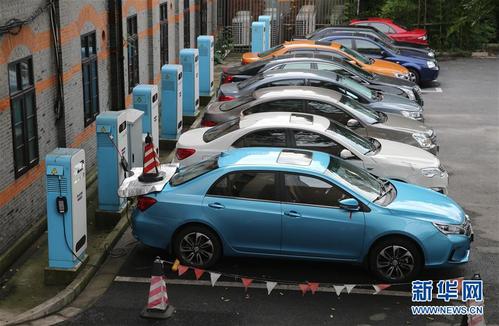

China’s State Council on March 31 introduced a raft of policies to boost auto consumption, a move expected to mitigate the severe impact on both production and demand in the auto industry brought by the global spread of the COVID-19 pandemic.

(Photo/Xinhua)
The policies have given a major confidence boost to auto markets, especially the new energy vehicle (NEV) sector, which has been suffering huge downward pressure.
The State Council announced at an executive meeting that it would extend subsidies and tax breaks for NEV purchases for another two years. It will also encourage Beijing, Tianjin and Hebei to phase out diesel-powered cargo vehicles under the country’s Stage III emission standards implemented since 2007, by replacing the existing subsidies with rewards.
The auto industry is a vital pillar of China’s economy. Last year, China’s industrial value added reached 32 trillion yuan ($4.52 trillion), and over 2 trillion came from the auto industry. The country’s total retail sales of consumer goods stood at 41 trillion yuan, with auto consumption accounting for nearly 10 percent.
“The policies to stabilize and expand auto consumption are of vital importance, and will further consolidate the progress and advantages of China’s NEV development,” said Cai Ronghua, a senior official with the National Development and Reform Commission (NDRC).
The extension of subsidies and tax breaks for NEV purchases are expected to bring tangible benefits to the NEV industry, which has suffered severe losses because of the COVID-19 pandemic.
According to Sun Guangqi from the Ministry of Finance, China started subsidizing the purchase of NEVs in 2009 and began implementing tax exemption measures for NEVs in Sept. 1, 2014. These two policies were scheduled to end at the end of the year.
Cui Shudong, secretary-general of the China Passenger Car Association (CPCA), attributed the continued growth of NEV sales in the past five years to the favorable tax policies.
China’s NEV production was less than 300 units in 2009, but the country became the largest NEV market in the world whose production and sales have both exceeded 300,000 units just six years later.
However, this prosperity also led to gradual cuts in subsidies. In 2019, after China slashed its subsidies, NEV sales began to decline, and the emerging COVID-19 pandemic this year dealt the sector another blow – NEV production and sales dived 63.8 percent and 59.5 percent respectively in the first two months of this year.
“Although China’s new energy industry had an early and sound start and enjoyed rapid development, it is still experiencing difficulties. The extension of policy support will help mitigate the impact from COVID-19 and create favorable conditions for releasing consumer demand,” said Sun.
 Fire brigade in Shanghai holds group wedding
Fire brigade in Shanghai holds group wedding Tourists enjoy ice sculptures in Datan Town, north China
Tourists enjoy ice sculptures in Datan Town, north China Sunset scenery of Dayan Pagoda in Xi'an
Sunset scenery of Dayan Pagoda in Xi'an Tourists have fun at scenic spot in Nanlong Town, NW China
Tourists have fun at scenic spot in Nanlong Town, NW China Harbin attracts tourists by making best use of ice in winter
Harbin attracts tourists by making best use of ice in winter In pics: FIS Alpine Ski Women's World Cup Slalom
In pics: FIS Alpine Ski Women's World Cup Slalom Black-necked cranes rest at reservoir in Lhunzhub County, Lhasa
Black-necked cranes rest at reservoir in Lhunzhub County, Lhasa China's FAST telescope will be available to foreign scientists in April
China's FAST telescope will be available to foreign scientists in April "She power" plays indispensable role in poverty alleviation
"She power" plays indispensable role in poverty alleviation Top 10 world news events of People's Daily in 2020
Top 10 world news events of People's Daily in 2020 Top 10 China news events of People's Daily in 2020
Top 10 China news events of People's Daily in 2020 Top 10 media buzzwords of 2020
Top 10 media buzzwords of 2020 Year-ender:10 major tourism stories of 2020
Year-ender:10 major tourism stories of 2020 No interference in Venezuelan issues
No interference in Venezuelan issues
 Biz prepares for trade spat
Biz prepares for trade spat
 Broadcasting Continent
Broadcasting Continent Australia wins Chinese CEOs as US loses
Australia wins Chinese CEOs as US loses